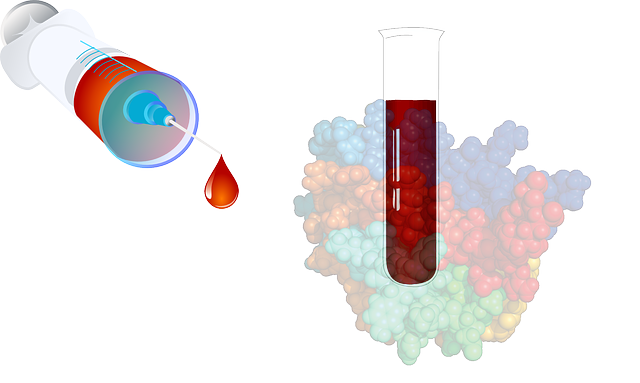The UK's healthcare system utilizes advanced liver function tests as a cornerstone of hepatic diagnostics, with the Vitamin B12 Blood Test being particularly significant. This test not only gauges B12 levels vital for neurological and haematological health but also provides insights into liver function. Abnormal results can indicate conditions like pernicious anemia, atrophic gastritis, or liver cirrhosis. Given the UK's diverse dietary habits, personalized treatment based on individual B12 serum levels is crucial. The Vitamin B12 Blood Test is part of a broader suite of markers that include albumin, bilirubin, ALT, AST, GGT, and ALP, offering a comprehensive liver health assessment. Healthcare professionals in the UK are adept at interpreting these tests alongside other clinical data to ensure early detection and effective management of liver conditions linked with or exacerbated by B12 deficiencies. This underscores the critical role of understanding liver health and the importance of the Vitamin B12 Blood Test UK in medical practice for accurate evaluations and effective treatment plans.
Exploring the intricacies of liver health, this article delves into the pivotal role of advanced liver function tests, with a spotlight on the Vitamin B12 Blood Test in the UK. It offers a detailed comprehensively analysis, elucidating the significance of Vitamin B12 in liver health assessment and how it influences test outcomes within clinical practice. Healthcare professionals will gain valuable insights into interpreting these tests accurately and effectively, ensuring optimal patient care and diagnosis. Understanding the nuances of liver function tests, particularly those involving Vitamin B12 levels, is essential for medical practitioners to manage hepatic conditions more effectively.
- Comprehensive Analysis of Advanced Liver Function Tests: Focus on Vitamin B12 Blood Test in the UK
- Understanding Liver Health: The Role of Vitamin B12 and Its Impact on Liver Function Tests
- Interpreting Liver Function Test Results with Special Emphasis on Vitamin B12 Levels in Clinical Practice
Comprehensive Analysis of Advanced Liver Function Tests: Focus on Vitamin B12 Blood Test in the UK

In the realm of hepatic diagnostics, advanced liver function tests play a pivotal role in assessing liver health and detecting underlying conditions that may affect this vital organ. Within the UK, healthcare professionals have access to a suite of sophisticated analytical tools, one of which is the Vitamin B12 Blood Test. This test is not merely a gauge of vitamin levels but also an indicator of liver function, as abnormal results can signal issues such as pernicious anaemia, atrophic gastritis, or even liver cirrhosis. The importance of Vitamin B12 in maintaining neurological and haematological functions is well-documented; deficiencies can lead to a host of complications, including megaloblastic anaemia and neurocognitive decline. In the UK, where dietary patterns vary widely, the Vitamin B12 Blood Test is particularly relevant, as it helps in tailoring interventions to individuals based on their specific B12 serum levels. This test is part of a comprehensive analysis that includes other liver function markers such as albumin, bilirubin, alanine aminotransferase (ALT), aspartate aminotransferase (AST), gamma-glutamyl transferase (GGT), and alkaline phosphatase (ALP). The synthesis of Vitamin B12 in the body is closely tied to liver function, making this test an integral component of a holistic approach to liver health monitoring. Healthcare providers in the UK are adept at interpreting these results within the broader context of a patient’s overall health, ensuring early detection and intervention for those whose liver functions may be compromised or at risk due to B12 deficiencies or other related conditions.
Understanding Liver Health: The Role of Vitamin B12 and Its Impact on Liver Function Tests

Understanding liver health is pivotal for medical professionals, as the liver performs over 500 vital functions in the human body. Among these, the metabolism and storage of nutrients are essential roles, and vitamin B12 plays a significant part in this complex biochemistry. Vitamin B12, a water-soluble vitamin, is crucial for DNA synthesis, red blood cell formation, and the regulation of homocysteine levels. Its deficiency can lead to megaloblastic anaemia and neurological issues, which are readily detectable through liver function tests. In the UK, a Vitamin B12 blood test is a standard diagnostic tool for assessing B12 levels; it’s a non-invasive procedure that provides valuable insights into a patient’s health status. This test is integral in interpreting liver function test results, as low B12 levels can indicate malabsorption syndromes or other conditions affecting the liver’s ability to process and store this essential vitamin. Consequently, medical professionals must consider these tests collectively to accurately evaluate liver function and identify underlying health issues, thereby ensuring appropriate treatment and management for their patients. The integration of Vitamin B12 blood test UK results within the broader context of liver function tests highlights the importance of comprehensive diagnostic approaches in healthcare settings. It underscores the need for medical professionals to remain vigilant and well-versed in the nuances of nutritional biomarkers and their implications for overall liver health and systemic wellbeing.
Interpreting Liver Function Test Results with Special Emphasis on Vitamin B12 Levels in Clinical Practice

In clinical practice, liver function tests (LFTs) play a pivotal role in assessing hepatic health and diagnosing conditions that affect liver function. Among the various components of LFTs, vitamin B12 levels are particularly significant due to their impact on liver health and overall patient well-being. Vitamin B12, an essential nutrient, is pivotal for DNA synthesis, red blood cell formation, and neurological function. In the UK, a Vitamin B12 blood test is readily available and serves as a critical diagnostic tool in monitoring this vital nutrient’s levels within the body. For medical professionals, interpreting these results requires a nuanced understanding of both normal ranges and the clinical context. Elevated vitamin B12 levels can indicate conditions such as liver disease or hemolytic anemia, while deficiencies may point to pernicious anemia, malabsorption disorders, or dietary insufficiency. Given that a significant proportion of the UK population may be at risk for B12 deficiency due to dietary habits or gastrointestinal conditions, regular monitoring and interpretation of these levels are essential for early intervention and management of associated health issues.
The interplay between vitamin B12 and liver function is complex; aberrant levels can influence the metabolism and detoxification processes within the liver. In cases where LFTs indicate liver dysfunction, it is imperative to consider B12 status as part of a comprehensive diagnostic approach. This is particularly relevant in the UK, where the prevalence of liver diseases such as cirrhosis and hepatitis can be influenced by lifestyle, dietary choices, and alcohol consumption. Medical professionals must therefore integrate vitamin B12 blood test results with other clinical data to formulate accurate diagnoses and effective treatment plans. The correlation between B12 levels and liver function underscores the importance of a holistic approach to interpreting LFTs, ensuring that patients receive the most appropriate care for their specific conditions.
In conclusion, the comprehensive analysis of advanced liver function tests underscores the critical role of Vitamin B12 within the UK’s clinical practice. Adequate Vitamin B12 levels are pivotal for accurate liver function assessments, as outlined in the article’s exploration of its impact on liver health. Medical professionals must prioritize interpreting Vitamin B12 results alongside other liver function markers to deliver precise patient care. The integration of Vitamin B12 Blood Test UK data into routine diagnostic procedures represents a significant advancement in hepatic diagnostics, ensuring early detection and management of liver-related conditions. Through this focused lens on Vitamin B12, healthcare providers can enhance their approach to liver health evaluations, ultimately benefiting patient outcomes and advancing the field of medical diagnostics.
